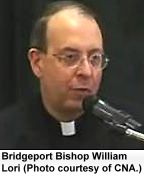California Catholic Daily
March 12, 2009
http://calcatholic.com/news/newsArticle.aspx?id=fe24bc7a-37bf-4952-a899-2312170066ef
 |
Connecticut bill that would have forced Catholic Church to reorganize pulled by sponsors, but Diocese of Bridgeport still wary
Hartford, Conn. (CNA) -- Following a deluge of phone calls and emails, a bill introduced in the Connecticut Senate to reorganize the financial and pastoral structure of the Catholic Church has been pulled and tabled for the rest of the legislative session.
Meanwhile, state Sen. Andrew MacDonald and state Rep. Michael Lawlor, the sponsors of the bill, have sent it to the state attorney general, Richard Blumenthal, to determine if it passes constitutional muster. The two lawmakers also canceled a hearing on the bill.
Despite the bill being pulled, the Diocese of Bridgeport is telling its members that the bill is still a possibility and that they are planning on proceeding with plans to rally against the proposed legislation.
"Furthermore," says a statement from the diocese, "we are deeply concerned about statements made by elected officials suggesting that Connecticut's existing religious corporation statutes, including those applicable to the Roman Catholic Church, are unconstitutional and should be amended. These statements are misinformed."
After pulling S.B. 1098, Sen. McDonald and Rep. Lawlor issued a statement saying that they believe Connecticut’s statutes treat some religions differently than others and that "many of our existing corporate laws dealing with particular religious groups appear to us to be unconstitutional under the rights guaranteed by the First Amendment of the U.S. Constitution."
But the Diocese of Bridgeport disagreed, arguing that "Connecticut's religious corporation statutes have been upheld by Connecticut courts for over a century precisely because they do not entangle the State in religious governance. Rather, they defer to the rules and governance structure adopted by each religious denomination, and thereby respect the religious freedoms of each denomination, as required by the First Amendment and our state Constitution."
"No court has ever found Connecticut’s religious corporation statutes to be unconstitutional, and there is no reason for the legislature to tamper with them," the diocese states.
The diocese also addresses the origins of Bill 1098, asserting that it "was based on a falsehood perpetuated by a few disgruntled individuals that the Roman Catholic Church has no financial controls in place. In actuality, the Diocese has in place one of the most accountable and transparent systems in the United States, including a whistle-blower that minimizes the risk of fraud."
McDonald and Lawlor say that they plan to convene a meeting of legal scholars and religious leaders to study the issue further.
Any original material on these pages is copyright © BishopAccountability.org 2004. Reproduce freely with attribution.